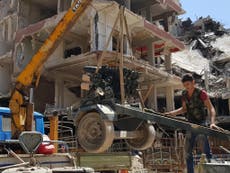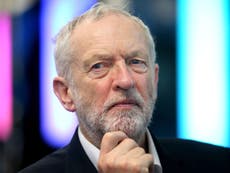Let's allow chemical weapons inspectors from the OPCW to do their jobs in Syria
As a participant in the negotiations that led to the 1992 Chemical Weapons Convention, Iran's ambassador to Britain says unilateral responses to the alleged gas attack in Douma are unhelpful. For an alternative view click here.
Last week’s military attack by the US, UK and France against sites in Syria allegedly connected to the research or production of chemical weapons has sparked controversy.
It remains unclear why the Organisation for the Prohibition of Chemical Weapons (OPCW), which is legally and internationally empowered to enforce verification of such weapons’ use, was not fully employed in relation to the alleged chemical attack in Douma. It is also unclear why the US and its allies could not postpone their action until the inspectors, who were already on their own way, could reach Douma and start their inspection activity.
The Chemical Weapons Convention (CWC) was concluded in 1992 after decades of negotiations at the Conference on Disarmament at Geneva. It was signed at the UN and its headquarters were established at the Hague. As a participant in those negotiations, I remember well that many years were invested in concluding a treaty with a truly proactive verification mechanism, enabling international inspectors to detect possible violations in the shortest time possible.
As a party to the convention, Syria says it is committed to allowing the inspection team to fully investigate the allegations of chemical weapons having been used. Syria had already fulfilled its undertakings to destroy stockpiles of such weaponry, with the OPCW reporting the destruction as complete. There is no obvious impediment to the OPCW conducting a comprehensive inspection to verify the alleged use – and accordingly production and stockpiling – of chemical weapons in Douma.
Unfortunately, the US, the UK and France acted in total disregard of the terms of the CWC and resorted to a unilateral assault on Syria, without authorisation from the UN, which is a clear violation of the UN Charter and against international law.
192 states have adhered to a universal treaty in an effort to realise their shared aspiration to achieve a world free from chemical weapons by implementation of a robust, multilateral, verification regime. The fact that a few countries consider themselves above the law, and are prepared to put themselves in the position of prosecutor, inspector and judge, without any legitimate mandate, in order to launch an attack on a UN member is destabilising to say the least.
In the aftermath of the military move by America and its friends, there is a new concern, which is that if OPCW inspectors cannot find conclusive traces of chemical weapons having been used, the US and its allies will claim that Syria deliberately wiped out the evidence. Although technically speaking chlorine (the gas alleged to have been used in Douma) is a substance which could fade away relatively easily, Sarin, the nerve agent which is also alleged to have been deployed, is quite persistent in the environment and its traces could be collected through environmental sampling.
The response by President Trump and his allies to the alleged use of chemical weapons by Syria shows there is a willingness by some countries to resort to unilateral policies to enforce disarmament obligations despite there being an internationally verifiable treaty in place. This is quite worrisome.
After all, such action undermines global and multilateral efforts against the development and use of weapons of mass destruction; it also endangers global and regional peace and security. Civilisation is based on a simple principle that the use of force should be contained by the rule of law, and that the rule of law should be applied to all without exception.
And the effective enforcement of international law is maintained when all countries, large and small, strong and weak, accept that such international rules should be applied as international standards. Let us hope that unilateralism can be stopped and multilateralism be restored.
Hamid Baeidinejad is Iran’s ambassador to the United Kingdom




Join our commenting forum
Join thought-provoking conversations, follow other Independent readers and see their replies